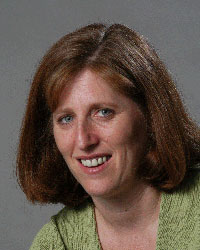Lauded for protein-folding work, 'encouragement of next generation’
The American Society for Biochemistry and Molecular Biology has named Susan Marqusee, professor of molecular and cell biology at the University of California, Berkeley, and director of Berkeley’s California Institute for Quantitative Biosciences, the winner of the society’s William C. Rose Award.

“I’m honored to receive an award that recognizes the sum total of what I love about my job — science, mentorship and training,” said Marqusee. “For me, it’s the melding of all three areas that gives me the greatest satisfaction.”
Marqusee received the award in recognition of her extensive thermodynamic and kinetic studies using hydrogen-exchange, nuclear magnetic resonance, and single-molecule methods to study protein structure and behavior at increasingly sharper resolution. According to Walter Englander, professor at the University of Pennsylvania, “this work convincingly revealed that proteins are composed of cooperative nativelike foldon units and demonstrated their key role in protein-folding pathways.”
Professors Carlos Bustamante and Jennifer Doudna of the University of California, Berkeley, nominated Marqusee for the award. “The fundamental nature of Dr. Marqusee’s work has had, and will continue to have, significant impact on many areas of research, ranging from the physical chemistry of macromolecules to the design of therapeutics that prevent the aggregation of proteins which lead to common diseases such as Alzheimer’s,” they wrote in their nominating letter.
Marqusee’s mentorship efforts also are recognized by the Rose Award. Her colleague Jane Clarke from the University of Cambridge hailed Marqusee as “an all-too-rare example of an academic who is not simply a stellar scientist but someone who explicitly factors into her way of doing science dedication to encouragement of the next generation. Her students simply adore her.”
Marqusee will get her award and deliver her lecture at 9:05 a.m. April 24 at the Experimental Biology 2012 meeting in the San Diego Convention Center.
About the award
The William C. Rose Award recognizes outstanding contributions to biochemical and molecular biological research and a demonstrated commitment to the training of younger scientists as epitomized by the late Rose, an authority on protein nutrition and former president of the ASBMB. The award consists of a plaque, $3,000 and transportation to the 2012 ASBMB annual meeting to present a lecture.
Enjoy reading ASBMB Today?
Become a member to receive the print edition four times a year and the digital edition monthly.
Learn moreGet the latest from ASBMB Today
Enter your email address, and we’ll send you a weekly email with recent articles, interviews and more.
Latest in People
People highlights or most popular articles

ASBMB announces 2026 JBC/Tabor awardees
The seven awardees are first authors of outstanding papers published in 2025 in the Journal of Biological Chemistry.

Decoding how bacteria flip host’s molecular switches
Kim Orth will receive the Earl and Thressa Stadtman Distinguished Scientists Award at the ASBMB Annual Meeting, March 7–10, just outside of Washington, D.C.

Thiam elected to EMBO
He was recognized during the EMBO Members’ Meeting in Heidelberg, Germany, in October.

The timekeepers of proteostasis
Learn about the cover of the winter 2026 ASBMB Today issue, illustrated by ASBMB member Megan Mitchem.

Defining JNKs: Targets for drug discovery
Roger Davis will receive the Bert and Natalie Vallee Award in Biomedical Science at the ASBMB Annual Meeting, March 7–10, just outside of Washington, D.C.

Building better tools to decipher the lipidome
Chemical engineer–turned–biophysicist Matthew Mitsche uses curiosity, coding and creativity to tackle lipid biology, uncovering PNPLA3’s role in fatty liver disease and advancing mass spectrometry tools for studying complex lipid systems.

